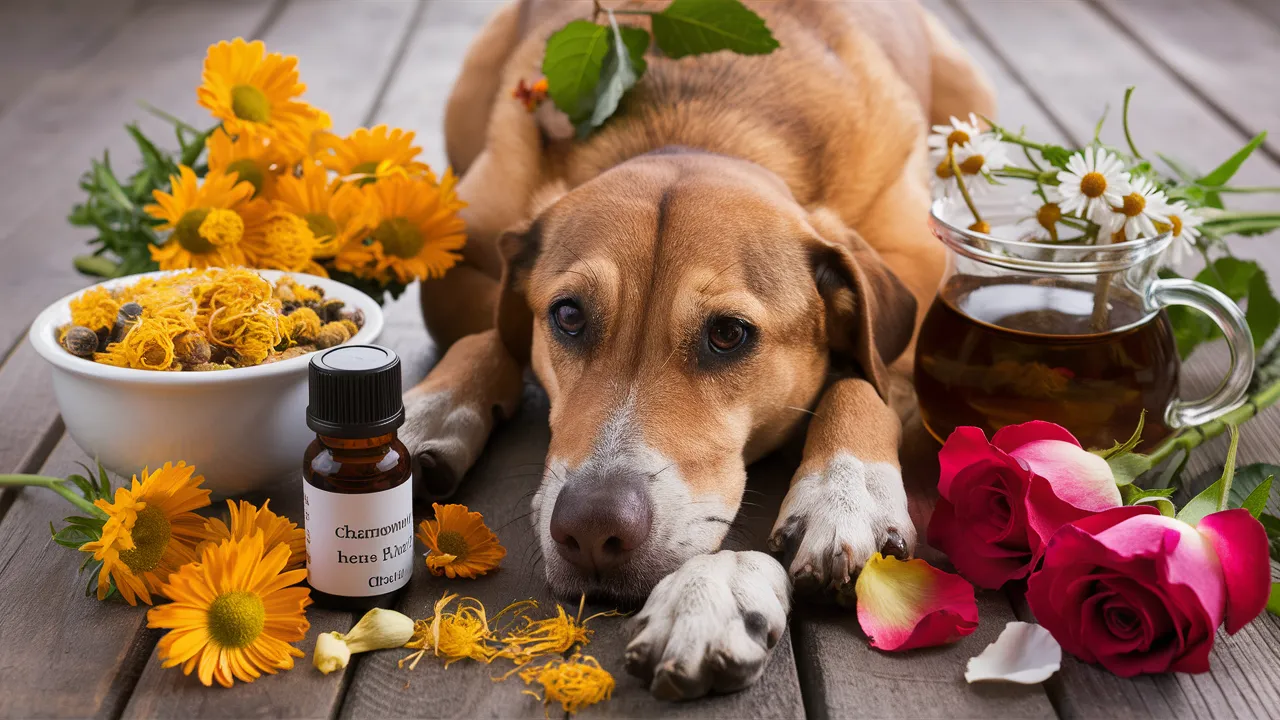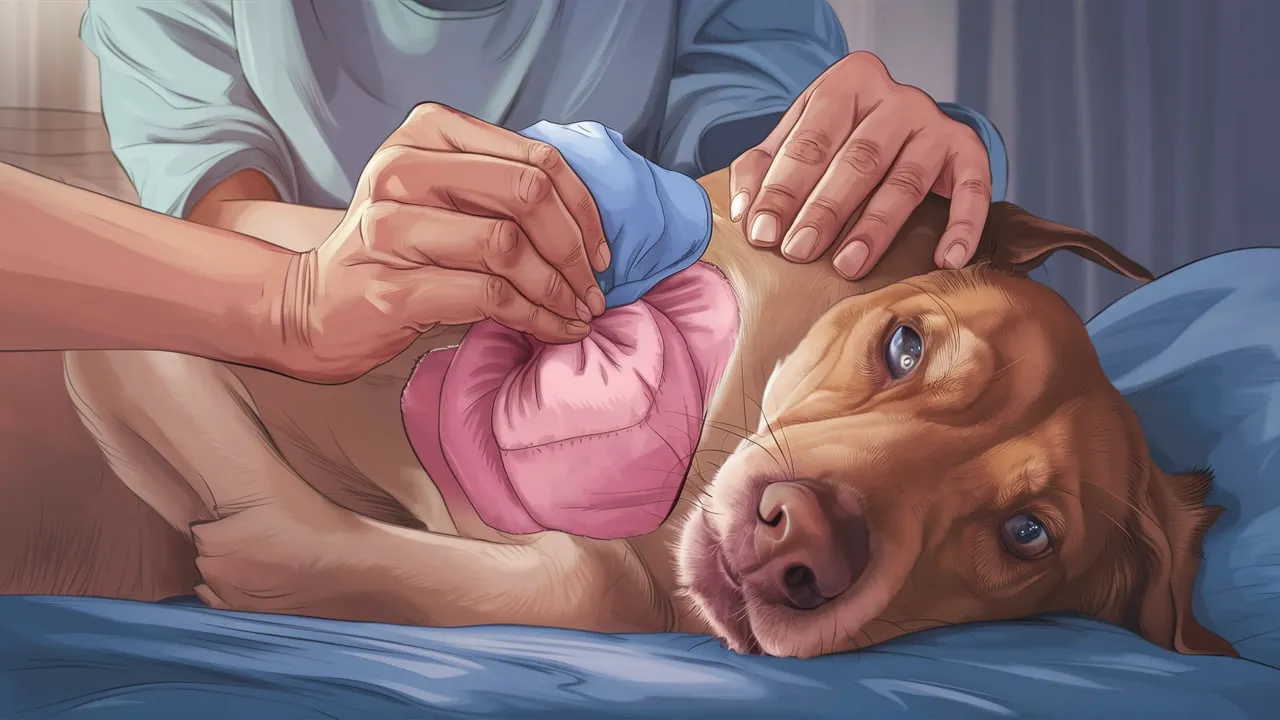Discover Home Remedies For Dog In Heat to help manage your dog’s heat cycle. Learn about behavior changes, bleeding, and how to keep your furry friend comfortable in Dogs Infor‘s article.
Understanding the Dog Heat Cycle

The dog heat cycle, also known as estrus, is a natural reproductive process that occurs in female dogs. It’s crucial to understand the signs, duration, and potential risks associated with this cycle to provide proper care for your dog.
Signs and Symptoms
- Vulvar Swelling: The vulva (external genitalia) becomes swollen and red.
- Bloody Discharge: A bloody discharge, often referred to as “heat,” is a prominent sign. The discharge may start as a dark red and become lighter over time.
- Increased Affection: Some dogs become more affectionate and seek attention during their heat cycle.
- Restlessness: They may become restless and try to escape from their enclosures.
- Male Dog Attraction: Male dogs are strongly attracted to females in heat, so it’s essential to keep your dog safe from unwanted matings.
Duration and Frequency
- Heat Cycle Length: A typical heat cycle lasts about 2-3 weeks, but it can vary depending on the breed and individual dog.
- Frequency: Most dogs go into heat twice a year, typically in spring and fall. However, some breeds may go into heat more frequently.
Risks and Complications
- Unwanted Pregnancy: If your dog is not spayed, she can become pregnant during her heat cycle.
- Pyometra: This is a potentially life-threatening uterine infection that can occur after a heat cycle.
- Breast Cancer: Unspayed dogs have a higher risk of developing breast cancer.
- Behavioral Changes: Some dogs may experience behavioral changes during their heat cycle, such as aggression or anxiety.
Home Remedies for Dog in Heat
While home remedies can offer some relief and comfort for dogs in heat, it’s crucial to consult with your veterinarian before using any remedies, especially if your dog is experiencing severe symptoms or if you have concerns about their health.
Calming Techniques
- Pheromone Diffusers: These diffusers release synthetic pheromones that mimic the calming signals dogs naturally produce, helping to reduce anxiety and stress.
- Calming Chews: Chews containing calming ingredients like chamomile, valerian root, or L-theanine can help soothe your dog and reduce anxiety.
Herbal Supplements
- Chamomile: Chamomile is known for its calming properties and can help reduce anxiety and promote relaxation.
- Valerian Root: Valerian root is a natural sedative that can help calm your dog and reduce restlessness.
- Consult Your Vet: Always consult with your veterinarian before giving your dog any herbal supplements, as some may interact with medications or have potential side effects.
Dietary Adjustments
- High-Quality Food: Ensure your dog is eating a balanced and high-quality diet to provide adequate nutrition during this period.
- Increased Water Intake: Encourage your dog to drink plenty of water to stay hydrated, especially if they are experiencing bloody discharge.
Hygiene and Comfort Measures
- Sanitary Pads: Use sanitary pads to absorb the bloody discharge and prevent staining.
- Cleaning Solutions: Use pet-safe cleaning solutions to clean up any messes caused by the discharge.
- Comfortable Bedding: Provide your dog with comfortable bedding and a quiet space to rest.
When to Consult a Veterinarian

While home remedies can provide some comfort for dogs in heat, it’s crucial to seek professional veterinary care if you notice any of the following:
Excessive Bleeding
- Heavy Bleeding: If your dog is experiencing excessive bleeding, especially if it’s soaking through sanitary pads or causing discomfort, it’s important to seek veterinary attention.
- Blood Clots: The presence of blood clots in the discharge can indicate a potential health issue.
Unusual Behavior
- Extreme Restlessness: If your dog is exhibiting extreme restlessness, anxiety, or aggression that is unusual for them, it’s best to consult with your veterinarian.
- Loss of Appetite: A significant decrease in appetite or refusal to eat can indicate a problem.
Lethargy or Weakness: If your dog appears lethargic, weak, or has difficulty moving, seek veterinary care.
Signs of Infection
- Fever: If your dog has a fever, it could indicate an infection.
- Swelling or Discharge: Any swelling or unusual discharge from the vulva, besides the normal bloody discharge, could be a sign of infection.
- Pain or Discomfort: If your dog is showing signs of pain or discomfort when you touch their vulva, it’s essential to consult with your veterinarian.
Unwanted Pregnancy
- Potential Pregnancy: If your dog is not spayed and you suspect she may be pregnant, it’s crucial to seek veterinary care for confirmation and guidance.
Alternative Solutions
When managing your dog’s heat cycle, there are several effective alternatives to consider.
- Spaying
Spaying serves as a permanent solution; this surgical procedure prevents your dog from going into heat and eliminates the risk of pregnancy. Additionally, spaying offers significant health benefits, as it reduces the risk of certain health issues, including pyometra, breast cancer, and uterine infections.
- Hormonal treatments
Hormonal treatments, on the other hand, provide temporary solutions. Options such as progestin injections or oral medications can suppress the heat cycle for a limited time.
However, it’s essential to consult your vet before using these treatments, as they can have potential side effects. By exploring these alternatives, you can make informed decisions that prioritize your dog’s health and well-being.
Conclusion
While Home Remedies For Dog In Heat can offer some comfort and relief. They are not a substitute for professional veterinary care. Hygiene and comfort measures, such as sanitary pads and comfortable bedding, can help keep your dog clean and comfortable.

Related Post
How Tight Should A Dog’s Collar Be? How To Determine
Get Rid Of Dog Tartar: Effective Removal Methods
Dog Crying At Night: Understanding And Solving The Problem